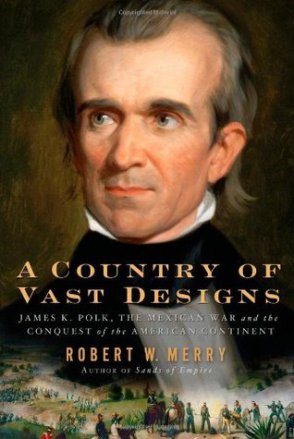
A Country of Vast Designs: James K. Polk, the Mexican War and the Conquest of the American Continent
Author: Robert W. Merry
Release Date: November 2010
James Polk is a president I knew more about than John Tyler or Martin Van Buren, but was still mostly limited to the expansion of the country and his mostly favorable place among his peers in the Oval Office by comparison. Although Polk was a one term president, he accomplished a great deal, and virtually everything he set out to do. This was despite having a Whig heavy House of Representatives for the last two years of his term, and a congress overall in flux with the democrat party beginning to be splintered along geographic lines on the issue of slavery. If Merry’s book is accurate, Polk also had to deal with several individuals that were incompetent in their job at best and maliciously traitorous to Polk at worse in his cabinet in James Buchanan and Nicholas Walker, and that’s before even looking at his generals Winfield Scott and Zachary Taylor, who at times were much more interested in their future political avenues than prosecuting the war against Mexico. Here’s how Polk stacks up in my presidential tally sheet.
Born Into – Polk was born in North Carolina to a moderately successful slave holding family, and moved to Tennessee as a small child. Much like his political idol, Andrew Jackson, Polk likely benefited from the frontier move as he was able to distinguish himself among his peers and advance to the top of Tennessee politics. 3/5
Pre-President – More than any other area in Robert Merry’s book, his pre-presidential career is really glossed over. If I recall, by about page 75, Polk has already been married, been in the military, been governor and speaker of the house and been voted out of office. The most memorable anecdote in those pages was young James Polk (12 years old?) being sedate with brandy and having urinary stones removed in a painful procedure that may have left him sterile. A lawyer by trade, Polk’s zealous support for all things Andrew Jackson (particular his opposition to the National Bank) aided him in standing out in the democrat party. His path to the presidency was also an interesting dark horse story, as he was originally just a VP candidate at the party convention, however Jackson’s newfound anti-Van Buren sentiment (due to Van Buren’s opposition to annexation of TX) opened door for him. After a new policy require a 2/3 majority before agreeing on a candidate effective knocked out the initial majority winner Van Buren (a northern favorite by states that would likely vote Whig), with Lewis Cass and Richard Johnson gaining votes and James Buchanan falling off the ballot. When Polk’s name was volunteered by the New Hampshire delegation, it was on the 8th ballot, and was quickly agreed upon by southern delegates. By the 9th ballot, he was the unanimous choice and eventually defeated Henry Clay (as so many others have before him) by sticking to democrat values at avoiding giving details on his position on tariffs. 3/5
Presidential Career – Polk’s presidential career began with a few snafu in selecting his cabinet: first with representing New York in the cabinet by selecting William Marcy which was probably more Van Buren’s fault and due to delays in the mail system at that time. Polk effectively appointed one of Van Buren’s enemies to his cabinet and divided New York Democrats for years afterwards. The other was appointing Buchanan to Secretary of State, who would repeatedly abuse the position, and leak confidential communications to the press all while setting himself up to succeed and Polk to fail whenever possible.
Polk outlined four private goals of presidency in his journal upon taking office:
· Settle Oregon question with Great Britain
· Acquire California from Mexico
· Reduce Tariff of 1842 with pure revenue rationale
· Revive Van Buren’s independent treasury
The Texas annexation went through per groundwork laid by Tyler, however in doing so it allowed Polk to pursue acquiring California through the most controversial moves of Polk’s presidency. Once the United States annexed Texas, and Mexico did not agree to it, the countries were essentially at war (Mexico was at war with Texas, which was then part of the U.S.A.). The southern border of Texas was also in dispute, and Texas had some claim to the Rio Grand river, so when Polk sent his troops to that location historians can now disagree if that began the war or if Mexico shedding first blood did. There is little dispute that Polk’s actions were more motivated by gaining territory for the country than defending Texas’s southern most claim, however the effect was America beating up on an inferior developed country with European imperialism as a motivation.
Simultaneously, Polk positioned himself that he was also OK with war Great Britain if it did not accede to our requests for settling the Oregon boundary. While Polk believed he could obtain up to through the 54th parallel, he ended up settling the Oregon territory dispute with a compromise made by prior presidents (49th parallel). However, it was him forcing the issue and appearing to be willing to go to war that allowed him to finish what prior presidents could not.
During the actual war, which lasted most of Polk’s presidency, the politics of the nation added much headache and delay in providing soldiers and funds. Whigs wanted to keep Taylor and Scott as the only generals so they could have a candidate for the next election (like William Henry Harrison was); Polk wanted to add Generals although it is unclear on if his motivations were to thwart Whig power or for military strategy. (Note – I’m noting a theme in wars where both parties vote to initiate war, and then the party opposite of the president takes a stand against the war shortly afterward (i.e. 1812, Mexican American, War on Terror, etc.)
Polk accomplished both his domestic goals with the help of a Democrat congress in his first two years; The Independent Treasury would be our system until 1913 when the Federal Reserve would replace it, and the critics of who stated it would lead to another Jacksonian recession were thwarted by discovery the of Gold In California soon after which boosted the economy. Likewise, as Britain embraced free trade later on, Polk’s reduced tariff victory also became moot.
Like all presidents of that era, Polk punted on the slavery issue when it was brought to the forefront. Specifically, when annexation of California territory entered the picture, Polk (along with many congressmen, including overrated abolitionist John Quincy Adams) felt slavery and California should not be an issue b/c there was no slavery in that territory and Congress should not preemptively make an issue where there wasn’t currently one.
Two of the most interesting headaches for Polk were Winfield Scott and Nicholas Trist, who both had prickly personalities and disliked Polk. Polk wasn’t fond of either of them as Scott’s political aspirations sometimes led him to disregard Polk’s orders and Trist’s resolve to end the war was more important to him than Polk’s aspirations of gaining land. However, Scott’s domination of General Santa Anna and Trist’s continuation of negotiations despite being recalled (transportation wasn’t yet there for him to leave initially, but he stuck around long past that excuse) ended up helping end the War on Polk’s terms. 4.5/5
Vice President – George M. Dallas was Polk’s vice president. Either he did nothing of interest while in office, or Robert Merry chose to ignore him. 1/5
First Lady – Sarah Childress was both a confidant to Polk as well as a successful first lady in performing the duties of the era. Much like Washington and Jackson, Polk is another president whose lack of children seemed to place an added emphasis on his wife as somebody to discuss the demands of his office. 4/5
Post Presidency – Polk died about four months after leaving office, taking just enough time to get home and get sick beforehand. 1/5
Book itself – Robert Merry’s biography is similar to other more recent president biographies, definitely written more for the normal book buyer than the scholarly peer. My biggest complaint is the glossing over of Polk’s early political career and military role. Had the author spend another 50 to 100 pages on this time frame, it would have been one of the best presidential biographies I had yet read. However, the result is still a fantastic and educating read, just one limited most primarily to Polk’s presidency. Large sections of the book completely ignore Polk in favor or explaining all the political intrigue going around him. While obviously no man exists in a vacuum, if you’re already well versed on Andrew Jackson and Henry Clay, much of this book could also be redundant to you. 4/5

- 4 Barrels
- Biography
- Presidential Biography






